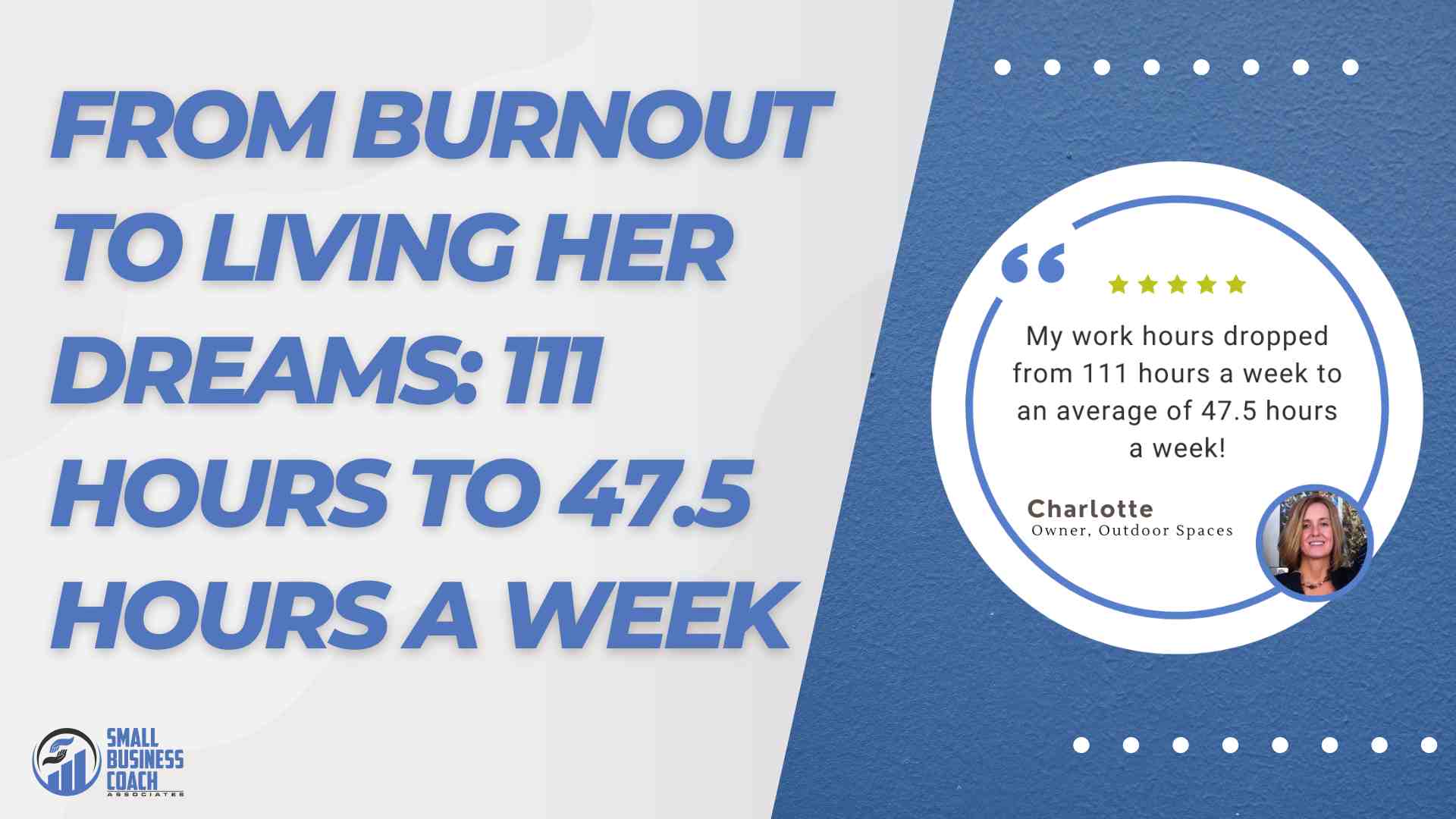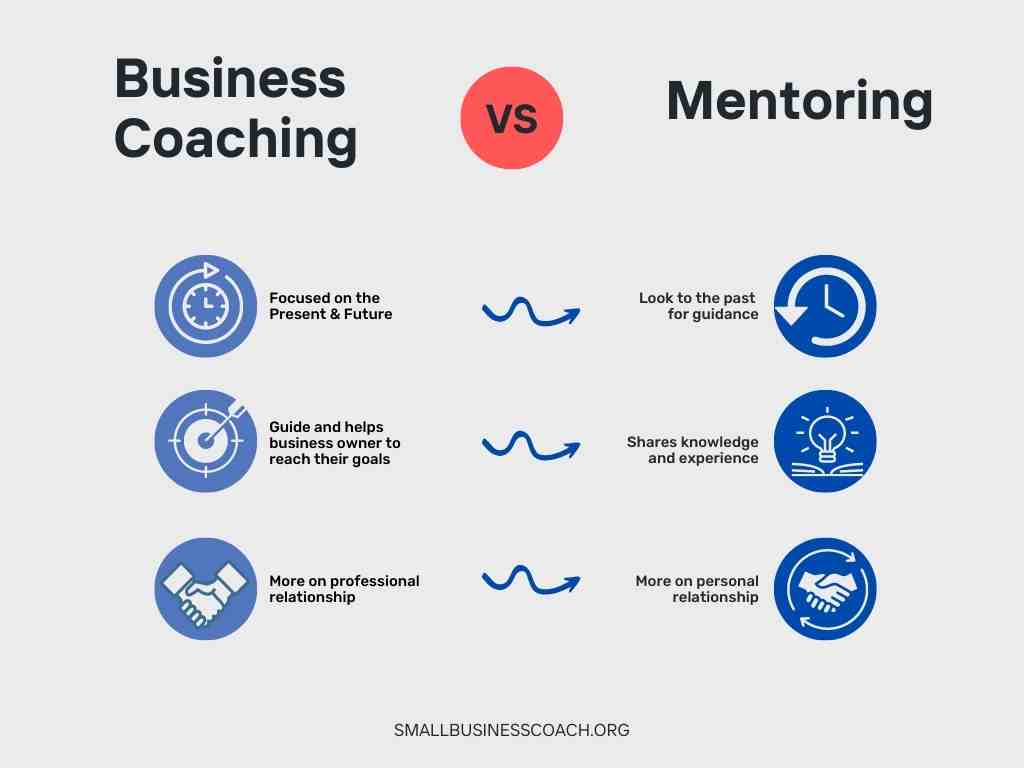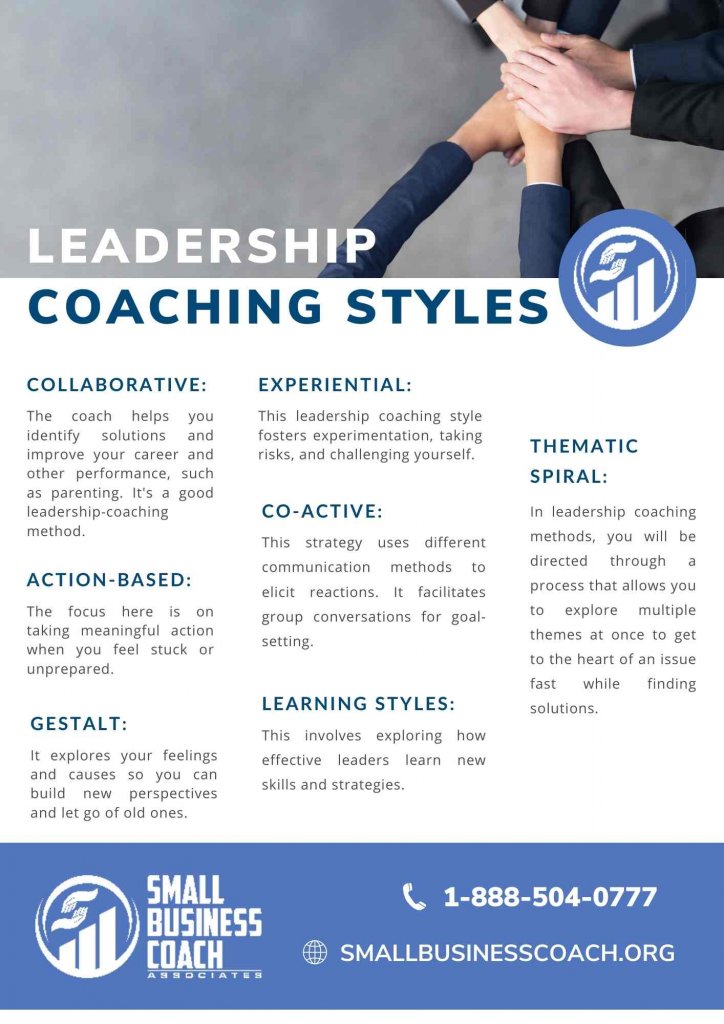
From Burnout To Living Her Dreams: 111 Hours To 47.5 Hours A Week
Burnout is not new to business owners.
You work hard to run and maintain the business. By working hard, you end up sacrificing things that are so important to you and to your business as well.
In the end, you see yourself working hard endlessly and not having the result you ever wanted.
In that respect, Charlotte was living a typical life of a burnout business owner.
She established her business in 2012 and grew her business. However, she felt that she was drowning and burned out.
Her business could only run with her. Why? She did everything from answering the phone to billing her clients.
She ended up working 111 hours a week and could barely take care of herself.
As Charlotte explained:
“I established my business in 2012, and we experienced extreme growth in 2020. However, by 2021 I was drowning. I was burning out. I was working more than 100 hours a week, and my health was suffering. My work week consisted of answering the phone, scheduling appointments, attending sales meetings, ordering products for clients, and billing clients.”
Some business owners believe that working hard is the key to success.
Doing things by themselves is the best for business growth.
Charlotte, on the other hand, recognized that she needed help. Even if her sales grew to a million dollars, she knew she would never be happy or have an amazing lifestyle.
So Charlotte took action. Eventually, she discovered Small Business Coach, and the rest is history.
“I reached out to my coach with Small Business Coach Associates. He showed me the 7 Stages of Business Freedom, and I was in the Burnout Stage. My coach helped me to develop a Strategic Plan and then to determine where I was spending my time and how to delegate tasks that were non-CEO level tasks and to work more in executive function activities. I had been focused on sales in the past but not on profits. Delegating lower-level work freed up time some we could work on our gross margins, and we determined that I had been underpricing my products.”
Charlotte has been an amazing client to work with. She is focused and true to her words in changing how she works and runs her business. She already did a great job of growing her sales. All that was needed was a little adjustment in managing her time and delegating tasks.
“I focused on developing employees, process improvement, improving inefficiencies, and managing customers. We are now on the path to Stage 7, the business freedom stage. As we implemented personnel development and daily time management, my entire mindset changed. I began to attend to myself first before working in the business, first with reading, exercise, and yoga. I now feel like I’m succeeding and have more peace. I hired my coach to help with infighting with my son, and I now know how to handle that. Before, I had an “elephant-sized problem,” and the elephant was sitting on me; now, I’m sitting on “the elephant.” My work hours dropped from 111 hours a week to an average of 47.5 hours a week!”
Now, she is living her dreams and on the path to business freedom. Since working with a small business coach:
✔ Charlotte’s working hours dropped from 111 to 47.5 hours a week.
✔Feels that she is succeeding and has more peace.
✔Now on the path to Business Freedom Stage
✔Continued the foundation and system she built for continued growth without a constant struggle.
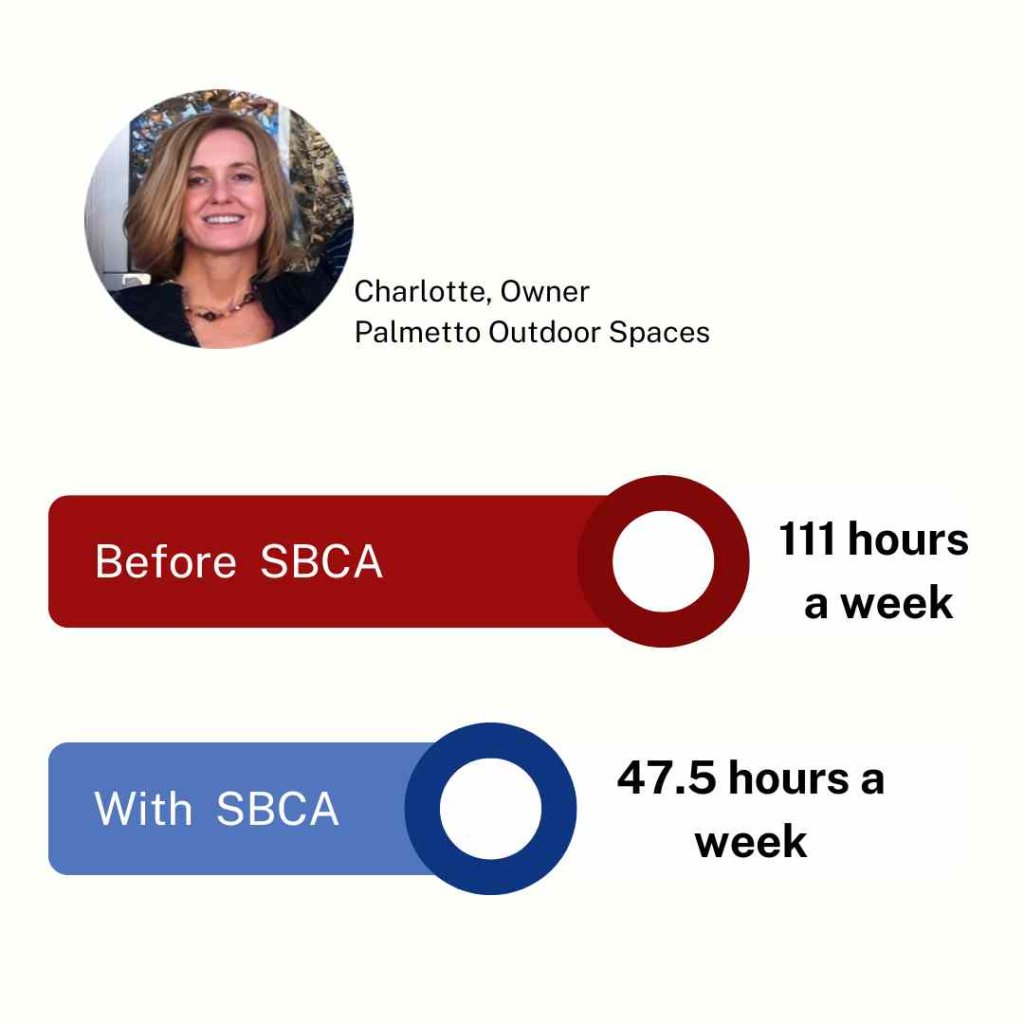
What is Burnout?
According to Helpguide, burnout is a state of emotional, physical, and mental exhaustion caused by excessive and prolonged stress.
Therefore, burnout can be triggered by factors such as working long hours, high workloads, lack of job satisfaction, and an inability to achieve a work-life balance. It can also be caused by an unhealthy organizational culture or work environment that is unsupportive or hinders personal growth.
As the stress continues, you begin to lose the interest or motivation that led you to take on a certain role in the first place. You may start to feel helpless, hopeless, and disconnected from colleagues and family members. Work may feel like a chore rather than a source of satisfaction and accomplishment. Eventually, you may feel like you have nothing more to give. This can lead to irritability, frustration, and blaming others for your circumstances. Are there any secrets? How did Charlotte free from the constant struggle and typical burnout business owners’ stories?
Why is burnout a common problem for business owners?
Burnout is a common problem for business owners due to its tendency to crawl up gradually over time. The combination of long hours, stressful decisions, high expectations, and lack of appreciation can quickly lead to feelings of exhaustion and overwhelm. With so many responsibilities on their plate at any given moment, business owners often find it challenging to prioritize self-care or recuperate, leading to burnout.
Burnout is a common problem for business owners due to its tendency to crawl up gradually over time. The combination of long hours, stressful decisions, high expectations, and lack of appreciation can quickly lead to feelings of exhaustion and overwhelm. With so many responsibilities on their plate at any given moment, business owners often find it challenging to prioritize self-care or recuperate, leading to burnout.
It’s like a car running out of gas – over time, the lack of rest and recovery can cause an entrepreneur to become drained, both physically and mentally. Without refueling the tank with essential elements such as quality sleep, good nutrition, and regular exercise, it’s difficult for business owners to stay motivated and productive. Even the most successful entrepreneurs need to be mindful of their energy levels and take the necessary steps to ensure they are not running low on fuel. They must find ways to re-energize and make time for themselves to prevent burnout, as it can devastate business performance. Taking regular breaks, delegating tasks, and planning ahead are all important steps business owners can take to avoid burnout and stay on the path to success.
Stress vs Burnout
Put simply; stress is like a spark while burnout is like wildfire–both have the potential to cause harm, but one happens suddenly, and the other grows slowly over time.
Stress is the reaction we experience when facing a difficult situation or demand. External pressures, such as work deadlines, family issues, or financial worries, can cause it. Stress can also result from internal factors like worrying about self-image or feeling overwhelmed.
Stress is usually short-term and can be managed with healthy coping strategies. However, when stress persists over time and goes unmanaged, it can lead to burnout. Burnout occurs when we are unable to cope effectively with long-term stressors, and our physical and mental exhaustion becomes overwhelming. Symptoms of burnout include a loss of motivation, lack of energy, or feeling overwhelmed. To combat burnout, it’s important to recognize and address the underlying stressors that may be causing it.
Are You heading down the path of burnout?
Yes, you are if:
➡You often feel tired, overwhelmed, and stressed out.
➡ You’re not enjoying activities that you used to find enjoyable.
➡You feel like you don’t have any control over your life.
➡You feel like you’re working too hard without getting enough done.
➡ You’re experiencing physical ailments due to stress
Types Of Entrepreneurial Burnout
Entrepreneurial burnout can manifest itself in different ways. Some of the most common types of entrepreneurial burnout include:
Time burnout: This type of burnout is caused by long work hours, lack of sleep, and deprivation of leisure time to relax.
Money Burnout: This type of burnout is caused by the frustration of not having enough money to cover business expenses, such as salaries and capital investments.
Motivation Burnout: This occurs when entrepreneurs become demotivated and stop taking risks or challenging themselves to grow their businesses.
Burnout from Perfectionism: This type of burnout is caused by feeling the need to be perfect in everything they do, which can lead to taking on too much and becoming overwhelmed with.
Burnout from Unsatisfactory Results: This type of burnout is caused by not achieving the desired results, leading to feelings of disappointment and frustration.
How may burnout affect a business if the owner is burnt out?
Burnout can significantly impact a business if the business owner is burnout. It decreases productivity, creativity, and effectiveness. Burnout can also lead to increased employee turnover as well as decreased morale in the workplace. All this adds up to reduced profitability and overall growth of the business.
Employees and customers may be able to tell if a business owner feels overwhelmed or stressed due to signs such as reduced engagement during meetings, difficulty making decisions, and changes in attitude towards work.
When a business owner feels overwhelmed or stressed, it can seriously impact the business’s success. Employees will become disengaged and less productive, leading to decreased output and efficiency. Customers may experience poorer service due to a lack of communication and reduced responsiveness from the business owner.
These issues can lead to decreased customer satisfaction and loyalty, resulting in decreased revenue. Additionally, the business owner may need more time to focus on long-term goals and strategies, leading to missed opportunities for growth and development. Business owners must take steps to manage their stress levels to ensure their businesses remain successful.
Can a business owner recover from burnout?
Yes, a business owner can recover from burnout. Business owners must step back and assess their priorities. It’s important to identify areas of stress or conflict and focus on ways to reduce them.
In Small Business Coach Associates, we recommended that our client take the Time Mastery System.
The Time Mastery System is a comprehensive system designed to help business owners get the most out of their time. It encourages them to plan and invest their time wisely, eliminating or delegating tasks that don’t need immediate attention so that they can focus on the CEO-level activities that require decisions and drive results. This type of time management can help business owners stay organized, prioritize their tasks and make the most of their time.
The Time Mastery System is useful in helping business owners plan and manage their time more effectively and helps them become more productive. By understanding their own time better and knowing how to use it to reach their goals, business owners can save themselves from wasting valuable hours on tasks that don’t benefit them in the long run. It also allows them to focus on the activities that will bring real success and growth to their businesses.
Steps to prevent and manage burnout
Fortunately, there are steps you can take to prevent and manage burnout. Here are some tips for avoiding or managing burnout:
Take breaks – Make sure you’re taking regular breaks from work to give your mind and body a chance to rest and recharge.
Exercise: Incorporating physical activity into your daily routine can help reduce stress and increase energy levels.
Establish boundaries – Learn how to set healthy boundaries with your business and manage workloads more effectively.
Connect with others – Spending time connecting with friends, family, or colleagues helps to reduce feelings of isolation and frustration.
Get enough sleep – Make sure you get at least 7-8 hours of quality sleep each night to help maintain your energy levels and emotional health.
Invest in some help – Delegating tasks or hiring someone can take some of the burdens off your shoulders and give you more time to focus on yourself.
Stop owning all the hustle because it gains you no muscle
Stop owning all the hustle to gain success because it won’t build the strong foundation you need for a lasting impact. Focus instead on working smarter and more efficiently to achieve your goals more sustainably.
Make sure to take time to focus on your mental and physical health, as well as strategize for long-term success. A balanced approach will help you create a better future and reach your goals effectively and sustainably.
Working hard is fine, but don’t make it the only thing you do. Take the time to appreciate and invest in yourself, too, so that when success finally comes, you’re ready to take advantage of every opportunity that arises. With a balanced lifestyle and a commitment to putting your best foot forward, you can achieve anything you set your mind to.
Going back to Charlotte’s story.
Are there any secrets? How did Charlotte free from the constant struggle and typical burnout business owners’ stories?
Let’s dig into her biggest lesson from her Small Business Coach experience:
Lesson#1
Strategic planning is essential for long-term business success and growth.
Strategic planning is essential for long-term business success and growth. It can help you identify opportunities, set realistic goals, and develop strategies to capitalize on those opportunities.
It’s the process of setting short and long-term goals, analyzing potential obstacles, and creating a plan to turn those goals into reality. It requires a strong vision, an understanding of the current market, and the ability to anticipate future changes.
“My coach helped me to developed a Strategic Plan, and then to determine where I was spending my time and how to delegate tasks that were non-CEO level tasks and to work more in executive function activities.”
Lesson#2
It’s important to delegate non-CEO level tasks to free up time for executive functions.
If you want to achieve success, it is important to delegate non-CEO level tasks. This allows you to focus on the executive functions of running a business and leads to greater productivity.
Charlotte realized what she had missed while we were working on the delegating process.
“I had been focused on sales in the past but not on profits. Delegating lower-level work freed up time to work on our gross margins, and we determined that I had been underpricing my products. I focused on developing employees, process improvement, improving inefficiencies, and managing customers. We are now on the path to Stage 7, the business freedom stage.”
By delegating tasks that are not strictly within the scope of the CEO’s responsibilities, you free up time, energy, and resources that can be devoted to achieving your business goals. As a leader, it is important to recognize when tasks can be delegated to other members of the team and trust them to do an effective job.
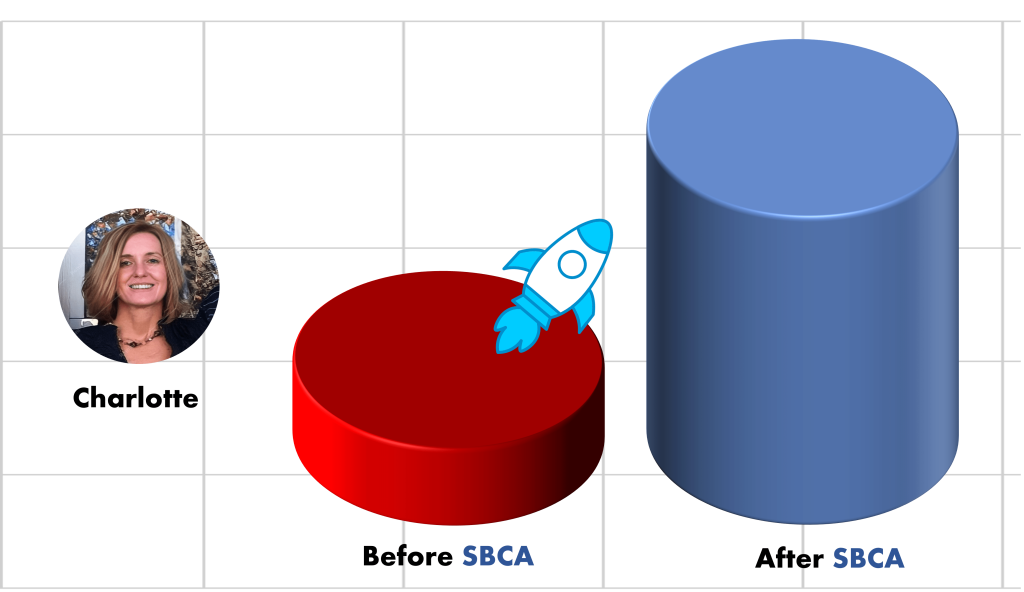
Lesson#3
Self-care needs to be prioritized in order to maintain physical and mental health when running a business.
Parker J. Palmer once said, “Self-care is never a selfish act – it is simply good stewardship of the only gift I have, the gift I was put on earth to offer others.”
In the context of running a business, this statement is especially true. Self-care should be a priority for business owners in order to maintain physical and mental health. Taking time out from the daily grind of work can help you feel refreshed, energized, and ready to tackle new challenges with renewed enthusiasm and vigor.
And this was true for Charlotte’s situation, as she mentioned
“As we implemented personnel development and daily time management, my entire mindset changed. I began to attend to myself first before working in the business, first with reading, exercise, and yoga. I now feel like I’m succeeding and have more peace. I hired my coach to help with infighting with my son, and I now know how to handle that. Before, I had an “elephant-sized problem,” and the elephant was sitting on me; now, I’m sitting on “the elephant.”
There you go. If you are in a situation similar to Charlotte’s and would like to take Charlotte’s biggest lesson and hire a coach to hold your hand to success, we’re here to help.

